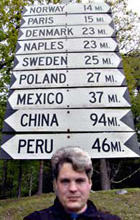Subscribe to the blog 
|
 |
 |
 |
 |
 |
Find a Flight Consider a Consolidator Rent a Car Pick a Railpass Book a Vacation Reserve a Room Get Gear |
|
||||||
|
Fleshburgers When traveling you are constantly discovering and learning. These discoveries tend to be lessons well learned and greatly appreciated from the safe distance of several years' retrospect and many thousands of miles. At the time, of course, you'd rather not discover anything that can't be easily explained and readily dealt with with the help of your guidebook and a few key Berlitz phrases. This is, of course, never the case. Especially where food is concerned. I discovered something about myself while standing in line at cafeteria (in German, "Kaffetierienessenplatz") on Alserstrasse, near our hostel in Wien. I discovered how little real, practical German I actually learned from conjugating all those verbs in high school. I also realized that what little I had learned did not include anything even remotely associated with food. I propose that my high school, and all others, include a list of basic phrases to be taught in the first year of any language, before you delve into the pluperfect tense. These would include such handy little snippets as "Is that the meat of an animal that we, as Americans, normally eat, or is it something we might keep as a pet?" This, you see, is a vital and invaluable phrase, one that guidebooks should print in bold letters on the front cover, which everyone should learn in the local language before venturing anywhere. This is especially true if that "anywhere" happens to be located in Austria. As my friends and I shuffled forward in line at the Viennese cafeteria, we peered at the various sandwiches and wursts on display, hazarding mental guesses on what they might be made of. We tried reading the signs that hung over each display plate, but the names were barely pronouncable, let alone translatable. Frances and Lauren looked at me expectantly and waited for me and my two years of high school German to decipher what could be considered lunch. Everything except the hamburger (which was clearly, and only marginally helpfully, marked "Hamburger") looked like a fried chicken sandwich. I hadn't even heard of any of the others except "Schnitzel," and I still don't even know what that is made of anyway. I searched in vain for the one item I expected to find in Vienna, but no tiny pickled hot dogs were in the window. Someone should complain to the embassy about that. My friends were still waiting for a translation. "Looks like fried chicken!" I said decisively. They were less than impressed. By then the line had moved forward a ways, and we were being addressed in German by a blond woman wearing a greasy apron and standing behind the counter. We quickly decided that we should all try this one sandwich that looked the most like fried chicken. It had a name like "Lieschen" or "Libchen" or "Liebling," although I really, really hope it wasn't that last one because from what I recall that word means "little dear one" and is used to refer to a daughter or niece. I asked the waitress "Was ist L-(whatever)in Englisch?" She looked confused. "Ist es...uh...chicken?" I continued hopefully. "Chicken?" I emphasized. I also raised my eyebrows in what I hope was an inquisitive and helpful manner that would translate as "Is that the meat of a flightless, somewhat stupid domestic fowl one might be inclined to fry and eat on a bun?" more >> |

